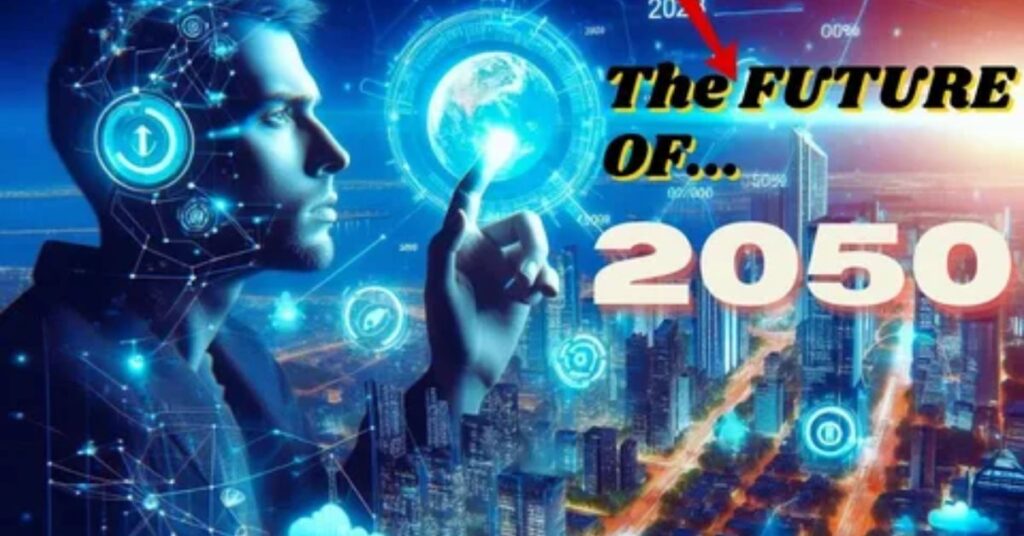Imagine waking up in a world where your home greets you, your breakfast is 3D-printed, and your car drives you while you catch up on sleep. That’s life beyond 2050. The future of technology isn’t just coming—it’s revolutionizing how we live, work, and connect. From AI companions to virtual reality vacations, tomorrow’s world will blur the line between imagination and reality.
By 2050, our daily routines will be powered by breakthroughs we can barely comprehend today. Think hyper-smart cities that adapt to your needs, wearable tech that predicts health problems before they happen, and robots doing chores while you focus on what truly matters. The future of technology is set to transform every corner of our lives, making things faster, smarter, and more personalized than ever.
Ready to glimpse the incredible possibilities ahead? Let’s dive into the life-changing innovations that await us beyond 2050!
The Dawn of 2050: A Technological Evolution
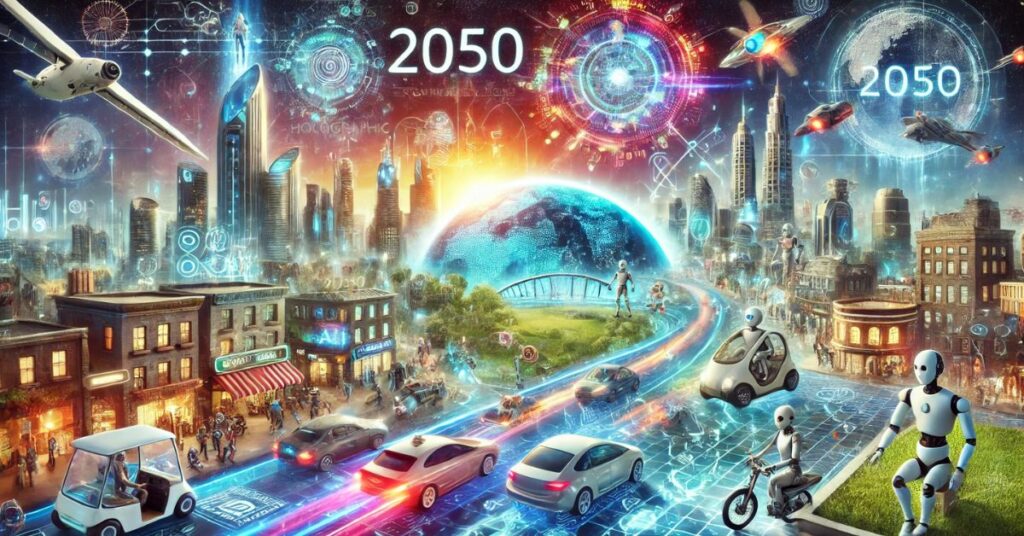
Welcome to the era where technology meets imagination. By 2050, life as we know it will transform beyond recognition. The future of technology promises to reshape industries, redefine human interactions, and elevate convenience to a whole new level. Imagine AI not just as assistants but as co-workers, collaborators, and even friends. Smart cities will be alive, adapting to every need of their citizens.
Medical advancements will erase diseases we thought incurable, while space travel may become as common as hopping on a plane. Education will move to virtual realms, offering immersive learning from anywhere in the world. The future of technology isn’t just about gadgets—it’s about creating a seamless, smarter world. Get ready for an evolution that changes everything!
From Smart Cities to Super Cities
The future of technology is taking cities to a whole new level. Smart cities of today, powered by AI and IoT, will evolve into super cities by 2050. These futuristic hubs will integrate technology seamlessly into every aspect of urban life. Imagine streets that clean themselves, traffic systems that eliminate jams, and buildings that adapt to environmental changes. Super cities will harness renewable energy at massive scales, ensuring sustainability. Public services will be fully automated, offering instant solutions to residents.
Advanced surveillance systems will enhance safety while protecting privacy through ethical AI. Education, healthcare, and transportation will be interconnected like never before. These super cities won’t just be places to live—they’ll be experiences that redefine convenience, efficiency, and quality of life. The future of technology is not just about innovation; it’s about transforming how we live, work, and connect.
The Role of AI in Everyday Decision-Making
By 2050, Artificial Intelligence (AI) will have become the silent partner in nearly every decision we make. From helping us plan meals based on our dietary needs and preferences to optimizing routes for our daily commutes, AI will seamlessly integrate into our lives. Its ability to analyze data in real time will provide tailored suggestions, ensuring we save time, energy, and resources. Need to choose a new insurance plan or decide on the best home upgrade? AI will sift through endless options, offering insights personalized to our priorities. This isn’t just convenience—it’s efficiency that transforms how we live.
Beyond personal use, AI will also shape collective decisions. Governments and organizations will harness AI to predict economic trends, tackle climate challenges, and allocate resources effectively. Imagine AI systems advising on disaster management, ensuring that aid reaches the right places faster than ever. This evolution won’t just improve decision-making; it will redefine trust, as we rely on AI to navigate complexities we once found overwhelming. In this symbiosis of human intuition and machine intelligence, our everyday lives will become smarter, simpler, and more connected.
How 2050 Tech Will Transform Daily Routines
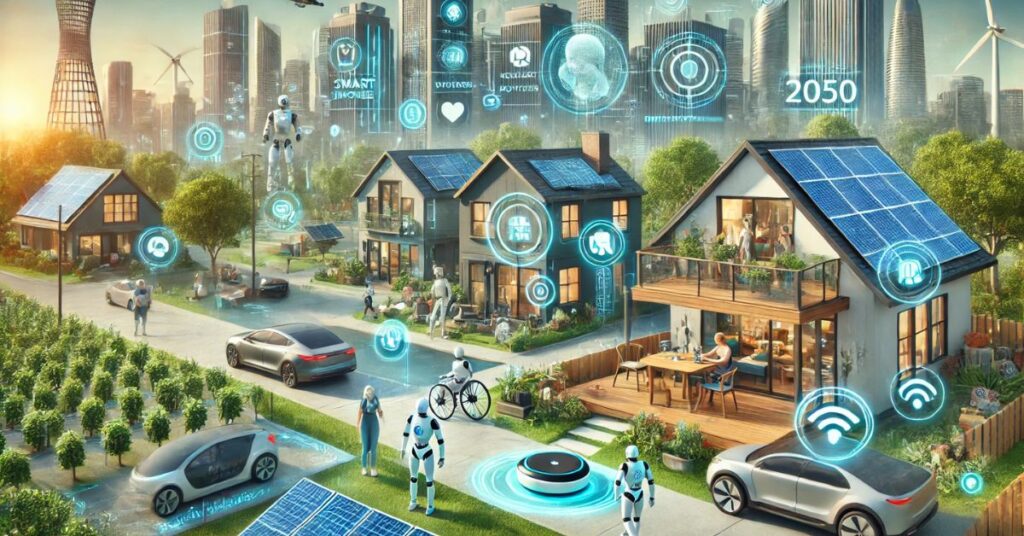
By 2050, the future of technology will completely redefine how we approach everyday tasks. Smart homes will anticipate our needs, adjusting lighting, temperature, and even brewing our coffee before we wake up. Wearable devices will monitor our health in real-time, giving instant alerts and suggestions for better living. From voice-controlled assistants managing schedules to AI chefs preparing meals based on nutrition goals, daily routines will become effortless and hyper-personalized.
Transportation will be revolutionized with autonomous vehicles eliminating traffic stress and reducing commute times. Virtual reality will transform work and leisure, enabling immersive meetings and entertainment from the comfort of our homes. Even grocery shopping will evolve, with drones delivering essentials within minutes. The future of technology promises a life where innovation eliminates mundane tasks, giving us more time to focus on what truly matters.
Morning Rituals in a Hyper-Connected World
In the future of technology, morning rituals will become seamless and intelligent. Imagine waking up to an AI alarm that adjusts itself based on your sleep cycles, ensuring you feel refreshed. Your smart home will start your day by gently raising the blinds, setting the perfect room temperature, and playing your favorite morning playlist. While you brush your teeth, your smart mirror could display the day’s weather, personalized news, and calendar updates, all tailored to your preferences.
Preparing for the day will no longer feel like a rush. AI-powered wardrobes will suggest outfits based on the weather and your plans, while your kitchen’s robotic chef whips up a nutritious breakfast. Even your morning workout will be guided by wearables tracking your performance and progress in real time. The future of technology will transform mornings into an efficient, enjoyable start to the day, freeing time for what matters most
Personalized AI Assistants for Every Need
In the future of technology, personalized AI assistants will cater to every aspect of our lives. These advanced companions will go beyond simple tasks like setting reminders or answering questions. They will understand our habits, preferences, and goals, proactively offering solutions before we even ask. From managing our finances to suggesting the best meal plans for our health, AI assistants will act as both advisors and problem-solvers. Their ability to adapt to our evolving needs will make them indispensable.
Imagine an AI assistant that organizes your day, learns your working style, and even suggests breaks when you’re stressed. For students, it will tailor study schedules and provide instant clarifications on complex topics. For families, it will manage household tasks, track budgets, and even plan vacations. The future of technology promises AI assistants that seamlessly integrate into our routines, simplifying complexities and giving us the freedom to focus on what truly matters.
The Future of Transportation: Moving Smarter, Faster
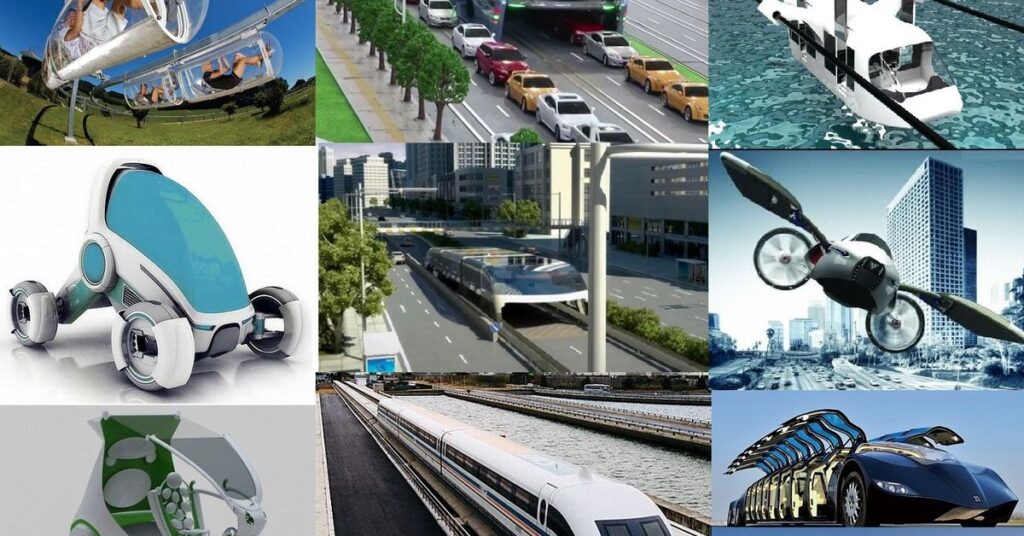
In the future of technology, transportation will be redefined by innovation, making travel smarter, faster, and more sustainable. Autonomous vehicles will dominate roads, eliminating human errors and reducing accidents. These self-driving cars will communicate with one another, optimizing traffic flow and slashing commute times. Public transit will also evolve, with AI-powered systems ensuring seamless connectivity and schedules tailored to real-time demand. Hyperloop technology and advanced electric trains will revolutionize long-distance travel, cutting hours into minutes.
Urban areas will see the rise of flying taxis and drone deliveries, offering efficient solutions for congested cities. Renewable energy will power most vehicles, making transportation eco-friendly and reducing our carbon footprint. Personal travel assistants, driven by AI, will plan routes, book tickets, and suggest the fastest and greenest options. The future of technology will transform how we move, making travel not just a necessity but an effortless experience.
Autonomous Vehicles and Hyperloops
In the future of technology, autonomous vehicles will reshape how we navigate cities and beyond. These self-driving cars will not only ensure safer roads by eliminating human errors but also offer unmatched convenience. Passengers can relax, work, or even sleep while AI takes care of the journey. With vehicles communicating in real time, traffic jams will become a thing of the past, and fuel efficiency will reach new heights.
Hyperloops, the high-speed pods traveling through vacuum tubes, will redefine long-distance travel. Capable of reaching speeds over 700 mph, they will connect cities in minutes, making commutes faster and greener. Powered by renewable energy and cutting-edge engineering, hyperloops represent a leap towards sustainable travel. The future of technology promises a world where transportation is not just efficient but revolutionary
Redefining Travel with Flying Cars
In the future of technology, flying cars will take travel to new heights—literally. These vehicles will combine the efficiency of cars with the freedom of flight, making urban mobility faster and more flexible. Imagine bypassing congested roads by soaring above the city skyline, reaching your destination in a fraction of the time. Advanced AI systems will navigate these vehicles, ensuring safety and precision even in busy airways.
Powered by clean energy, flying cars will also pave the way for greener transportation. They will connect remote areas, reduce the need for extensive road infrastructure, and create a new era of convenience. The future of technology will transform travel, turning science fiction into everyday reality, and giving us unparalleled freedom in how we move.
Healthcare in 2050: A New Frontier

personalized, and more effective. AI-powered diagnostics will detect diseases at their earliest stages, long before symptoms appear. Wearable devices will continuously monitor health, providing real-time insights to prevent emergencies. Personalized medicine will ensure treatments are tailored to individual genetic profiles, maximizing effectiveness and minimizing side effects. Robotics will assist in surgeries, delivering precision beyond human capabilities.
Telemedicine will dominate, connecting patients with specialists from anywhere in the world in seconds. Virtual reality will enhance medical training, enabling surgeons to practice complex procedures in simulated environments. Breakthroughs in regenerative medicine will allow the growth of organs for transplants, reducing waiting times and saving countless lives. The future of technology will not just improve healthcare—it will redefine how we experience wellness, creating a healthier and longer-living world
Nanotechnology and Disease Prevention
Nanotechnology is transforming disease prevention with precision at the molecular level. Tiny nanobots can detect diseases early and deliver targeted treatments. Unlike traditional methods, this approach reduces side effects and speeds up recovery. This breakthrough marks a new era in healthcare.
As the future of technology evolves, nanotech offers smarter vaccines and faster diagnostics. Early detection using nanosensors can save lives by starting treatments sooner. This innovation is redefining prevention and promising a healthier future for all.
Virtual Doctors and Immersive Treatments
Virtual doctors are redefining healthcare by making expert consultations accessible from anywhere. Through AI and telemedicine platforms, patients can receive accurate diagnoses without visiting a clinic. Immersive treatments like VR therapy are transforming mental health care and pain management. These innovations not only save time but also reduce costs significantly. This advancement highlights the future of technology, where convenience meets efficiency.
Immersive treatments are revolutionizing rehabilitation and therapy. Virtual reality simulates real-life scenarios, aiding faster recovery for patients. Combined with virtual doctors, this creates a seamless healthcare experience. From personalized care plans to remote surgeries, technology is shaping a smarter medical future. As the future of technology unfolds, these trends promise improved healthcare for all
Work and Education Beyond 2050
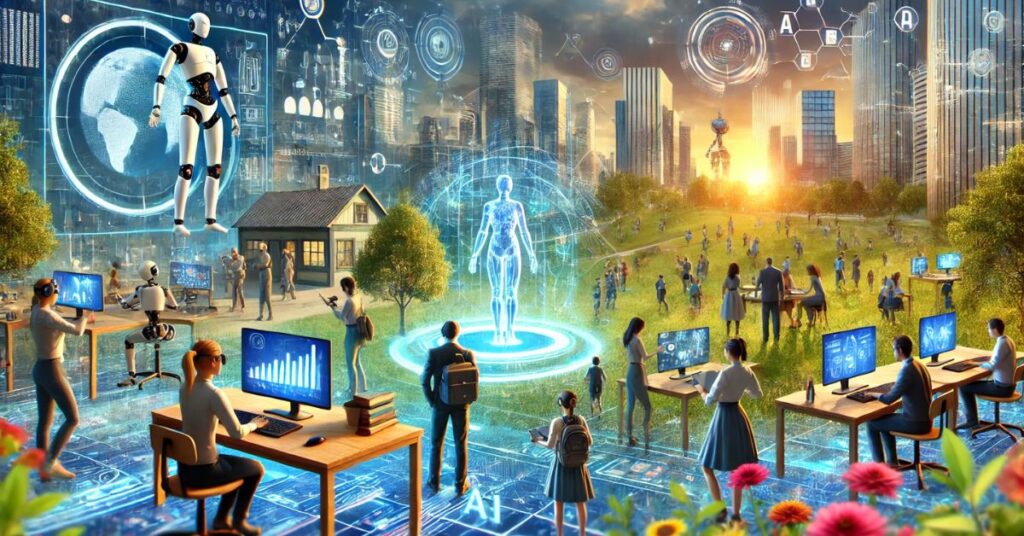
By 2050, work and education will be transformed by advanced technologies. AI-powered tools will automate routine tasks, enabling people to focus on creativity and innovation. Virtual classrooms will replace traditional schools, offering personalized learning experiences. Holographic teachers and immersive simulations will make learning engaging and accessible to all. This evolution reflects the future of technology reshaping how we learn and work.
In the workplace, robots and AI will handle complex tasks alongside humans. Remote work will become the norm, with virtual offices creating seamless global collaborations. Education will prioritize skills like problem-solving and adaptability to match future demands. As the future of technology drives these changes, it promises a world of endless possibilities for growth and development.
Remote Work Powered by Holograms
Holograms are set to revolutionize remote work, making virtual interactions feel real. Imagine attending meetings where lifelike 3D projections of colleagues surround you. This innovation bridges the gap between in-person and remote experiences. With holographic technology, brainstorming sessions and presentations become immersive and engaging. The future of technology lies in creating workplaces that are accessible yet collaborative, no matter where you are.
Beyond meetings, holograms will transform training and teamwork. Employees can work on virtual prototypes or attend lifelike training sessions from home. This reduces travel costs and boosts productivity. As the future of technology advances, remote work will feel more connected and dynamic. Holograms promise to redefine how we work, making distance irrelevant.
Education in the Metaverse
The metaverse is reshaping education, creating limitless possibilities for immersive learning. Virtual classrooms offer students the chance to explore historical landmarks or distant planets in real-time. Lessons come alive with 3D environments, making complex concepts easy to understand. Teachers can use avatars and interactive tools to engage students like never before. This innovative approach highlights the future of technology, where education becomes more dynamic and inclusive.
Beyond traditional subjects, the metaverse introduces virtual skill-building and career simulations. Students can practice surgeries, engineer designs, or explore art galleries without leaving their homes. Collaboration across borders becomes effortless, fostering a global learning community. The future of technology ensures that education in the metaverse is not just a trend but a game-changer for generations to come.
Challenges of Future Technology
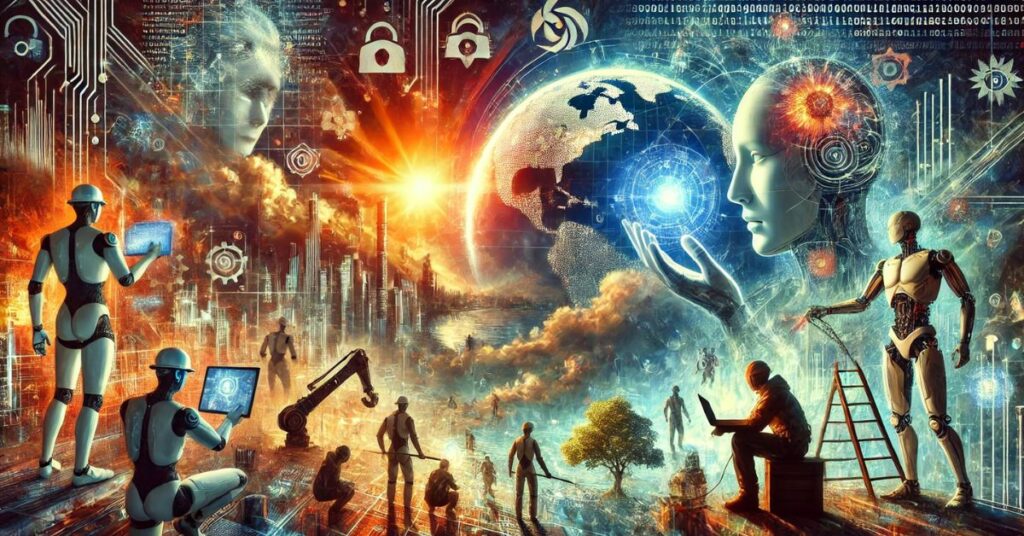
The future of technology promises groundbreaking advancements, but it also comes with complex challenges. One major concern is ethical dilemmas. Technologies like AI and gene editing raise questions about privacy, control, and morality. As we rely more on automation, there’s a risk of job displacement, leaving millions without stable employment. Another pressing issue is cybersecurity. With more connected devices, vulnerabilities increase, making personal and organizational data prone to breaches. Balancing innovation with safety is a hurdle the world must overcome.
Additionally, the future of technology demands sustainable solutions. The rapid growth of devices and data centers contributes to environmental degradation. Energy consumption is skyrocketing, putting pressure on global resources. Bridging the digital divide is another challenge, ensuring no one is left behind as new technologies emerge. Governments, innovators, and communities must work together to address these obstacles. The future is bright, but navigating these challenges will define how technology truly transforms society.
Balancing Privacy in a Connected World
In the future of technology, maintaining privacy in an increasingly connected world is a critical challenge. Smart devices, social media, and IoT have made life more convenient, but they also collect vast amounts of personal data. This data is often shared or sold, raising serious privacy concerns. As technology evolves, the thin line between convenience and surveillance becomes harder to manage. Users want personalized experiences, yet they also demand control over their information. Striking this balance requires robust regulations and transparent policies.
The future of technology must prioritize privacy without hindering innovation. Advanced encryption, AI-driven security tools, and user-friendly privacy settings are essential. However, education plays a key role too. People need to understand how their data is used and the risks of sharing it freely. Tech companies and governments must collaborate to build trust in this connected world. Without proper safeguards, the cost of connectivity could be our most valuable asset—privacy.
Sustainability and Tech’s Environmental Impact
The future of technology is reshaping industries, but it comes with an environmental cost. Rapid innovation has led to increased e-waste, as devices become obsolete faster than ever. Data centers, which power our digital lives, consume enormous energy, contributing to carbon emissions. Mining rare earth materials for electronics depletes resources and harms ecosystems. These issues highlight the urgent need for sustainable practices in technology production and use. If left unchecked, tech’s environmental footprint could outweigh its benefits.
To create a sustainable future of technology, industries must adopt green solutions. Renewable energy can power data centers, reducing their environmental impact. Recycling programs and eco-friendly materials can minimize e-waste. Tech companies should invest in circular economy models, extending the life of products. Consumers also play a role by choosing sustainable options and reducing tech waste. By aligning innovation with sustainability, we can ensure that technological progress doesn’t come at the planet’s expense.
Conclusion
The future of technology will redefine how we live, work, and connect by 2050 and beyond. From AI-driven cities to sustainable solutions for global challenges, technology promises a world of opportunities. However, it also comes with complex ethical, environmental, and social implications that must be carefully addressed. The choices we make today will determine whether these advancements create a more inclusive and sustainable future.
As we step into an era shaped by the future of technology, collaboration between governments, innovators, and communities will be crucial. Embracing innovation while safeguarding values like privacy, equality, and environmental health will pave the way for a better tomorrow. The road ahead is exciting but demands responsibility, creativity, and bold action to ensure that the future truly benefits humanity and the planet.
FAQ,s
What will homes look like in 2050?
Smart, energy-efficient, and AI-driven for ultimate convenience.
Will jobs still exist in the future of technology?
Personalized medicine and AI-powered treatments will revolutionize care.Yes, but heavily transformed by automation and AI.
How will transportation change by 2050?
Futuristic modes like flying cars and hyperloops may dominate.
Will technology solve climate change by 2050?
Innovations in clean energy and sustainability could make a big impact.
How will healthcare evolve in the future of technology?
Explore how AI and tech innovations are transforming healthcare for a smarter, healthier future

